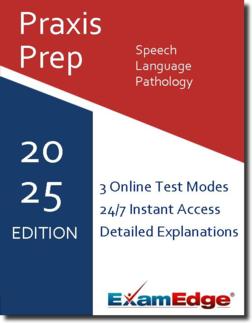Praxis Speech-Language Pathology (5331) Practice Tests & Test Prep by Exam Edge - Additional Information
Based on 29 Reviews
- Real Exam Simulation: Timed questions and matching content build comfort for your Praxis Speech-Language Pathology test day.
- Instant, 24/7 Access: Web-based Praxis Speech-Language Pathology practice exams with no software needed.
- Clear Explanations: Step-by-step answers and explanations for your Praxis exam to strengthen understanding.
- Boosted Confidence: Reduces anxiety and improves test-taking skills to ace your Praxis Speech-Language Pathology (5331).

Praxis Speech-Language Pathology - Additional Information
Speech-language pathologists are vital to the education of students everywhere. Children who experience stuttering, developmental delays, and other communication challenges rely on the skills and knowledge of talented speech-language pathologists. Of course, before these professionals can begin working with students, they must first demonstrate their readiness for the challenges at hand. The Praxis Speech-Language Pathology exam was developed to challenge new speech-language pathologists on their skills. Praxis Speech-Language Pathology practice tests are a great way to prepare for this challenging exam.
Because our practice tests are web-based, there is no software to install and no need to wait for a shipment to arrive to start studying. Your Praxis Speech-Language Pathology practice tests are available to you anytime from anywhere on any device, allowing you to study when it works best for you. There are 15 practice tests available, each with 120 questions and detailed explanations to help you study. Every exam is designed to cover all of the aspects of the Praxis Speech-Language Pathology exam, ensuring you have the knowledge you need to be successful!
What is the Praxis Speech-Language Pathology Exam?
The Praxis series of exams were created to help standardize the requirements for teachers across the country. While hardly the only teaching certification exams offered for new educators, the Praxis is perhaps the most widely known. Many states require new teachers to take and pass the Praxis before they begin working in the classroom with students. The Speech-Language Pathology Praxis was specifically designed with the challenges and expectations of speech-language pathologists in mind. Advanced preparation is required for those aiming to pass this test on their first attempt. Praxis Speech-Language Pathology practice exams can help examinees prepare.
Who Should Take the Praxis Praxis Speech-Language Pathology Exam?
If you're hoping for a successful career as a speech-language pathologist in public schools, you'll likely be required to take and pass this exam before you begin job hunting. It's an excellent way for professionals to demonstrate their mastery of key skills and ideas. Certification is typically non-negotiable, os anyone serious about an education career should sign up for this test. Of course, extensive Praxis Speech-Language Pathology exam prep is advised.
How Much Does the Praxis Speech-Language Pathology Exam Cost?
It's important to factor in the fees associated with the Praxis into your plans. Initial registration fees cost $120. Additional fees may be assigned based on your preference for score reporting. Once you've passed the exam, there may be other fees associated with becoming licensed within your home state. Given the costs associated with this test, you'll want to guarantee a passing score on your first attempt. Praxis Speech-Language Pathology test prep is always a good idea in the weeks and months leading up to the exam.
How Many Questions Are on the Praxis Speech-Language Pathology Exam?
The Praxis Speech-Language Pathology exam contains 132 total multiple-choice questions. They must be answered during the 150 minute testing period. In order to pass, you'll need to earn at least 162 points on a scale from 100 to 200 points. Expect questions on topics including foundations, professional practice, childhood development, epidemiology, and characteristics of communication and swallowing disorders. Teachers can refresh their memory of this challenging subject matter with a Praxis Speech-Language Pathology practice test.
Prepare Now for Your Praxis Speech-Language Pathology Exam
You've worked hard to earn your teaching degree. After so many years of preparation, you're probably eager to get into the classroom and work with students directly. If certification is the last hurdle standing in your way, it's important not to allow test anxiety to hinder your success. By taking a Praxis Speech-Language Pathology practice test, you'll get unique insight into how you might perform if the test were happening today. It's the simplest way to identify blind spots in your knowledge while also eliminating any possible surprises on the day of the actual exam.


